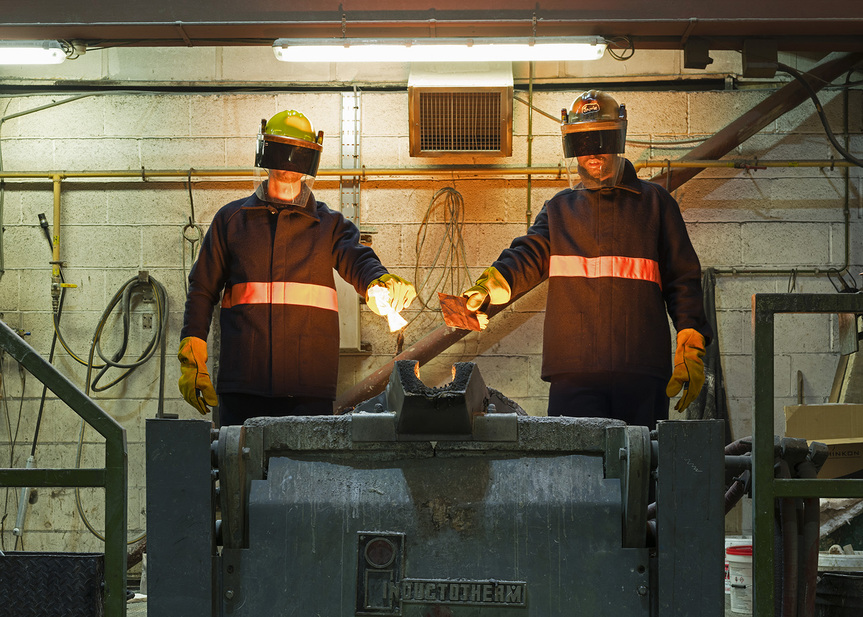
R
E
V N
E
X
T
At Alchemy Festival 2017, FAIZA BUTT’s Paracosm (2015) was evocative of the Kaaba in Mecca. Photo by Ned Carter Miles for ArtAsiaPacific.
Making Gold: Alchemy Festival 2017
From May 19 to 29, the largest festival of South Asian culture in the United Kingdom, Alchemy, returned for the eighth time to London’s Southbank Centre. Overlooking the River Thames—the artery at the heart of the capital and country—this complex of arts venues became home to a thoughtful and celebratory exploration of the rich, intricate and at times thorny relationship between the UK and the subcontinent, 70 years after the end of the British Raj. Among the festival’s highlights were performances of music, dance and stand-up comedy, literary debates, talks and recitals, workshops, food markets and visual art installations.
Faiza Butt’s Paracosm (2015) was typical of the Pakistani artist’s psychedelic, visually exuberant work, informed by growing up in Lahore at a time when billboards, advertising, comics and propaganda provided inspiration in the absence of art galleries. Four decorated walls—lit from within—were arranged into a loose cube, recalling the Kaaba at the center of al-Masjid al-Haram in Mecca. Illuminated on their surfaces are diverse collages—Assyrian sculptures of human-headed winged bulls, arid landscapes, colorful and chaotic imagery of cosmic forms—accompanied by lines of poetry from Kashmiri scribe Agha Shahid Ali and the revolutionary poet Faiz Ahmad Faiz. These texts, often on a black background and framed by gold patterns, once more evoked the Kaaba and, along with the combination of secular and religious imagery, created a space in which visitors could consider the complexities of modern Pakistani identity.
Exploring the partition of India by the British that created Pakistan in 1947, New York-based filmmakers Sheba Remy Kharbanda and William Charles Moss’s Five Rivers: A Portrait of Partition (2014), made a cycloramic video installation out of a reconstructed Indian wedding tent. Filmed interviews with Kharbanda’s father, Amrik Singh, about his experiences during the Partition, were projected in synchronicity with footage of landscapes, historical documentation and a soundtrack of contemporary Punjabi and Urdu poetry to devise a multidimensional documentary work, where the tent represents a congregational space in which to contemplate shared histories.
On the same floor as these two installations was My Granddad’s Car (2011– ), a collection of photographs, films and objects created by two British-born artists, Sayed Sattar Hasan and Karl Ohiri, which documents their relationships to two cars inherited from their respective grandfathers in Pakistan and Nigeria. The pair originally intended to return the cars to the United Kingdom, uniting them as ancestral symbols in the multicultural country where the two men had met and become friends, but corruption and bureaucracy in their ancestral homelands ultimately became insurmountable. However, Hasan and Ohiri managed to salvage some metal from the two cars, which they melted together in the United Kingdom to create a roughly steering wheel-sized, perfectly formed torus, cleansed of the rust that covered the original vehicles and richly symbolic of the artists’ relationship and journey together. In a similar expression of unity, Nepalese artist Milan Rai took over the Royal Festival Hall spaces at the top of the building, covering the panoramic fifth-floor windows with thousands of paper butterflies, visible against the backdrop of one of the city’s most impressive views.
In addition to the installations, which remained in place for the festival’s duration, were myriad programmed events. The London premiere of Sukanya, an opera by the late legendary Hindustani classical musician and composer Ravi Shankar, was accompanied by a conversation with his widow, Sukanya Shankar, and an exhibition documenting significant artifacts from the artist’s near-60-year association with Southbank Centre. Abida Parveen—one of Pakistan’s finest Sufi vocalists of the modern era—gave a one-off performance, and the Centre was also host to the Karachi Literature Festival, which included numerous speakers with links to both Pakistan and the United Kingdom, including novelist Mohammed Hanif.
Though lasting only 11 days, Alchemy lived up to its name. It took a variety of elements, derived from numerous cultures, and made gold.
The itinerary for Alchemy Festival 2017 included the London premiere of RAVI SHANKAR’s opera Sukanya (2017). Photo by Bill Cooper. Courtesy Bill Cooper and the Royal Opera House, London.
Alchemy Festival took place from May 19 to 29, 2017, at Southbank Centre, London.
To read more of ArtAsiaPacific’s articles, visit our Digital Library.







